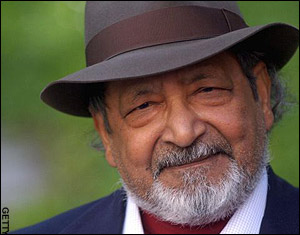 In an interview with the Royal Geographic Society last Tuesday Booker and Nobel-Prize winning novelist V.S. Naipaul said he didn’t consider any woman writer his literary match. For evidence, he offered up Jane Austen, stating that he “couldn’t possibly share her sentimental ambitions, her sentimental sense of the world,” elaborating that women writers are “quite different . . . I read a piece of writing and within a paragraph or two I know whether it is by a woman or not. I think [it is] unequal to me.”
In an interview with the Royal Geographic Society last Tuesday Booker and Nobel-Prize winning novelist V.S. Naipaul said he didn’t consider any woman writer his literary match. For evidence, he offered up Jane Austen, stating that he “couldn’t possibly share her sentimental ambitions, her sentimental sense of the world,” elaborating that women writers are “quite different . . . I read a piece of writing and within a paragraph or two I know whether it is by a woman or not. I think [it is] unequal to me.”
Of course, he isn’t blaming women for their inferiority, he went on to explain that they can’t be equal to him because they aren’t “masters of a house.” Naipaul then rounded out his douchebaggery with a dig at his former editor Diana Athill, saying, “My publisher, who was so good as a taster and editor, when she became a writer, lo and behold, it was all this feminine tosh. I don’t mean this in any unkind way.”
Naipaul is, as one blogger called him, a “noted shit talker” who has generally behaved like an ass in the past, most famously feuding with the travel writer Paul Theroux (Although the two kissed and made up at the Hay Literary Festival last weekend, right before Naipaul took on Austen. Maybe he is slowing down and can only handle one feud at a time?) In any case, his cranky behavior isn’t surprising.
What has been interesting is the response from literary critics and journalists. Articles about Naipaul’s big mouth have ranged from the sarcastic and fatigued to the apologetic — filled with, well there never has been a lady Shakespeare or a lady Tolstoy logic (never mind that the way we’ve determined “greatness” has been dominated by a patriarchal view of the world or that for most of human history women haven’t had the same opportunities to write). The best response came from The Guardian, which set up a quiz to see if readers can tell the difference between male and female writers. My husband scored a7 out of 10, assuming that each selection was a trick. I scored a 6 out of 10, but only because I recognized 5 of the passages. Or, maybe it was because of my sentimental lady brain.
Of course, all of this raises the question — why respond at all? Great writers can be terrible human beings, there is no reason that we have to dignify Naipaul’s ridiculous assertions with any kind of response — this is just the kind of attention he wants. It’s obvious that female writers and male writers are equals and “greatness” is highly subjective so we don’t have to say a word, right? I’m not so sure.
My grandmother always used to say, “consider the source” when discussing whether one should respond to unpleasant behavior (this was usually aimed at my grandfather when he was in a surly mood). I understand what my grandmother was getting at, the criticisms and judgments of others usually say more about them than they do about the object of their scrutiny. And, we want our responses — dignified, measured, in no way feminine tosh — to reflect well on us when we confront sexism.
But the truth is that Naipaul’s blowhard opinions carry with them a sting of legitimacy, not because he’s right, but because he is expressing a worldview that still runs through every part of our culture, albeit usually in more subtle ways. As Salon writer Mary Elizabeth Williams writes:
“what he’s really getting at is a persistent attitude that runs rampant not just in the arts but in business, in sports, and anywhere men and women congregate: that the feminine is automatically unimportant and inferior, that “size and weight,” so to speak, are the only criteria worth measuring. Edith Wharton and Willa Cather and, for that matter, the brilliant J.K. Rowling did not write like dudes. The Brontë sisters didn’t either, although their alter egos Currer, Ellis and Acton Bell sure pulled the wool over a few eyes in their time — even if they couldn’t have fooled a lady-sniffing genius like Naipaul. The female experience in the world is unique from that of the male. Yet plenty of people, not just gasbag old men giving interviews to the Royal Geographic Society, believe different is lesser, that merit is synonymous with masculinity. That to think or run or react or write like a girl is insufficient.”
Considering the source might mitigate the anger or sadness I feel when I encounter bad behavior, but I can’t and don’t think I should maintain a dignified silence when it comes to the idea that being a woman is insufficient.

Prediction: In 200 years English speaking/reading people will likely still be reading Jane Austen but no one will be reading V.S. Naipaul. And, by that time, there will have been a female Tolstoy (actually, I think I could make a strong argument that Tolstoy “writes like a woman” and that Anna Karenina is the greatest novel ever written).
I actually wonder if there has been a female Tolstoy and we just can’t see it yet because not enough time has passed. I’m not sure Tolstoy “writes like a woman,” but Anna Karenina makes a strong argument that the lives of women and the domestic sphere are subject matters for great art.
I agree: there have been female writers greater than Tolstoy, and artists in many forms, greater, too. Our obsessions with canon and the Western Literary Tradition as established by white male critics, that’s what stops us from seeing them more prominently in our cultures.
On the domestic sphere, a lot of my work focuses on the ability that such architectural frames are containers for repression and expression. The home is an (perhaps THE) primary environment for so much of human psychology. If men haven’t been present in that environment, or have missed its importance, then they are at a disadvantage to express its dramatic and psychological centrality.
On Naipaul: we live in a world of sound-bites and headline-grabbers. I can’t think of a more cynical way to garner publicity than this kind of stunt.
Fascinating. Really, so many “great” novels by both men and women take place within the context of the home or within the context of family relationships.